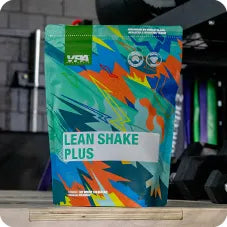Your Cart is Empty
WPI vs WPC – what’s the difference?
April 16, 2020 6 min read

If you’re in the market for whey protein, you've likely come across whey protein concentrate (WPC) and whey protein isolate (WPI). But what’s the difference, and which one best suits your goals? This blog will explain the difference between WPI vs WPC so that you can choose the best protein for you.
Protein is perhaps the most important supplement for fitness enthusiasts, bodybuilders, and athletes looking to have more control over their diet. It is a necessity for individuals looking to get fitter, healthier, or stronger. While protein powders may come from a variety of sources, the most effective protein powders are dairy and whey protein powders. Whey protein comes in two main forms, whey protein concentrate (WPC) and whey protein isolate (WPI). Before we delve into the differences between the two, let’s examine what protein supplements are and where they come from.
What Are Protein Supplements?
Protein supplements are dietary supplements used to meet daily nutritional requirements, especially when these goals are difficult to achieve through diet alone. These supplements typically come in powder form and can be used to improve athletic performance, enable muscle repair, and build muscle mass. Whey protein, specifically, is known for its rapid absorption and complete amino acid profile, making it an ideal choice for muscle recovery and growth. But when it comes to choosing whey protein, it’s important to understand the differences in WPI vs WPC protein. Let’s start by understanding what whey protein is.
What is Whey Protein?
Whey protein is the powdered by-product of milk and cheese-making. So, the next time you spot those bottles of milk and blocks of cheese at the supermarket, remember that whey protein is what’s left over once the whey is separated from the milk. You can find a more detailed discussion about whey protein here.
WPI vs WPC – What’s the difference?
| Aspect | WPC | WPI |
| Production process | Less processed: Retains fats and carbs | More processed: Fats and carbs removed |
| Nutritional profile | Approx 75-80% protein, 4-7% fat, relatively high lactose content | Approx. 90% protein content, low-fat, low-carb, low-lactose |
| Biological and nutritional benefits | Contains amino acids, ideal high-protein snack | High in BCAAs, ideal for muscle recovery and growth |
| Digestibility and absorption | Slower digestion and absorption | Rapid digestion and absorption |
| Usage scenarios | Gain muscle mass, ideal if you want to feel full for longer | Gain lean muscle, ideal for a low-calorie diet |
| Cost-effectiveness and value | Less expensive | Slightly more expensive due to more processing, but contains more protein per serve |
| Suitability for different diets | Suitable for most diets | Suitable for lactose-intolerant diet |
| Potential allergens and intolerances | Contains lactose | Minimal lactose, better for lactose-intolerant people |
| Taste, flavour and solubilit | Creamier and richer taste, thicker consistency | Mild flavour, thinner consistency and easily soluble |
The Production Process
During production, WPI vs WPC are differentiated by their filtration levels: WPC is microfiltered once, while WPI is filtered a second time. This second filtration further removes fats and carbohydrates from the original product, producing a more refined protein. This process means that WPI is a more pure whey protein than WPC.
Nutritional Profile
Due to being more highly refined, WPI has a higher protein, lower fat, and lower carbohydrate percentage compared to WPC. Good quality WPI vs WPC percentages are around 90% protein for WPI and about 75-80% for WPC. VPA® pure whey protein concentrate has 23g of protein per serve, 0.7g of fat and 1.5g of sugars from lactose. VPA® Whey protein isolate has 26g of protein per serve, 0.3g of fat, and 0nly 0.3g of sugar.
Biological and nutritional benefits
When comparing WPI vs WPC protein, both offer biological and nutritional benefits, but each has unique strengths depending on your fitness goals. WPC is a great source of amino acids, making it a balanced snack with fats and carbs. WPI is rich in branched-chain amino acids (BCAAs), which are effective for muscle recovery and growth. It's also high in protein purity with minimal carbs and fats.
Digestibility and absorption
The higher fat and lactose content of WPC makes it a slower-digesting protein than WPI. The fact that WPI is more rapidly digested and absorbed into the bloodstream, makes it the best choice for taking after training to build muscle and aid recovery. However when it comes to satiety, both whey protein powders or protein in general can help you feel fuller for longer– so both are ideal for a high-protein snack in between meals.
Usage scenarios
Both WPC and WPI are great options if you’re looking to gain lean muscle mass while helping you stay fuller longer. WPI in this case is just lower in calories and carbohydrates, making it an ideal option if you’re tracking your macros.
Cost-effectiveness and valu
In WPI vs WPC cost comparison, WPC is generally the more budget-friendly option and WPI is slightly more expensive due to additional processing. However, WPI offers higher protein purity and more protein per gram, justifying the extra cost.
Suitability for different diets
WPI is the more suitable protein powder for people with lactose intolerance. This is because WPI undergoes additional filtration to remove most of the lactose, resulting in a purer protein that is better for lactose-intolerant people. When choosing between WPI vs WPC, individuals with dairy sensitivities may find WPI to be a more comfortable option.
WPC contains more milk fat or lactose than WPI with around 4-7% fat. This is not necessarily a bad thing, as this fat can contain beneficial nutrients not found in WPI. In result,this may cause digestive discomfort if you’re sensitive to lactose or dairy.
Taste, flavour and solubility
When it comes to WPI vs WPC taste, WPC has a richer, creamier flavour and a slightly thicker consistency, while WPI has a milder flavour and a thinner consistency, making it easily soluble. When it comes to flavour, both WPC and WPI are available in amazing flavour options like chocolate, vanilla, caramel biscuit, and many more at VPA Australia.
Choosing Between WPI and WPC: Expert Advice
Choose WPC if you’re after a cheaper, slower-digesting protein that contains lots of macronutrients and bioactive compounds. WPC is a great option to consume throughout the day.
Choose WPI if you’re after pure whey protein powder with lower levels of fat, carbohydrate and lactose, with fewer calories than WPC. WPI is ideal for people who want to get fast-digesting protein into their body after a workout or want to restrict the number of calories they consume. Additionally, those sensitive to dairy or lactose may benefit from choosing WPI over WPC due to the increased protein weight percentage over other compounds.
Conclusion
So, there you have it – the differences between WPI vs WPC protein types. As you can see, both forms of whey protein have their strengths, and you may find each of them helpful at different times. It can be very useful to utilise a combination of each type of protein to assist you in reaching your goals.
FAQs
What is WPC in whey protein?
WPC, or whey protein concentrate, is a type of whey protein supplement that is less processed than whey protein isolate WPI, retaining fats and carbs. It has a protein content of around 75-80% and contains relatively high lactose levels.
Is WPI a complete protein?
Yes, it is a complete protein that contains all 20 amino acids.
Is WPC better than WPI?
In the question of WPI vs WPC protein, each has unique strengths: WPC is better for those seeking a more affordable protein that digests slowly and helps them feel full longer. In contrast, WPI is better for those looking for a fast-digesting protein with fewer carbs, fats, and lactose, making it more suitable for post-workout recovery and lean muscle gains. People looking to follow a low-calorie diet may also opt for WPI.
Is WPI protein worth it?
Yes, WPI is worth it for those needing a purer, fast-digesting protein with low fat, carbs, and lactose content. It is ideal for post-workout recovery and low-calorie diets and has more protein content per gram which justifies its cost.
What's the difference in how quickly the body absorbs WPI compared to WPC?
WPI is absorbed and digested more quickly than WPC, making it ideal for post-workout recovery. WPC digests more slowly, making it better for those wanting to feel fuller for a longer period.
Which type of whey protein is better for muscle gain or weight loss: WPI vs WPC?
While both WPI and WPC can help with weight loss and muscle gain, WPI is recommended for a low-calorie diet and therefore, might be considered slightly better.
Can I use WPI or WPC if I'm lactose intolerant?
WPI is generally suitable for those with lactose intolerance due to its low lactose content.
What are some tips for adding WPI or WPC to my diet effectively?
Adding whey protein to the diet is easy. Mix protein supplements with water, and milk, or add it to smoothies, and try using flavoured options from VPA to make high-protein desserts. Whey protein can be enjoyed as a snack replacement or as a pre or post-workout boost.
Can increasing my protein intake with WPI or WPC impact hair growth or prevent hair loss?
There’s not enough evidence suggesting any correlation between whey protein and hair growth.
References
Tinsley, Grant, Ph.D., CSCS,*D, CISSN. "Whey Protein Isolate vs Concentrate: What's the Difference?" Healthline, 7 Sept. 2018, https://www.healthline.com/nutrition/whey-protein-isolate-vs-concentrate
Gunnars, Kris. "Whey Protein 101: The Ultimate Beginner's Guide." Healthline, 7 Feb. 2023, https://www.healthline.com/nutrition/whey-protein-101#:~:text=Effects%20of%20Whey%20Supplementation%20on,their%20performance%20in%20the%20gym
Leonard, Jayne. "What Are the Benefits and Risks of Whey Protein?" Medical News Today, 10 Mar. 2023, https://www.medicalnewstoday.com/articles/263371
Also in Supplements

The Ultimate 12-Week HYROX Training Plan (Beginner-Friendly + Expert-Approved)
December 04, 2025 7 min read
Read More
What Is HYROX? The Complete Beginner’s Guide to the World’s Fastest-Growing Fitness Race
December 04, 2025 8 min read
Read More
The Ultimate HYROX Fuel Plan: When and How to Use Energy Gels for Maximum Output
October 15, 2025 6 min read
Read More Recent Articles
- The Ultimate 12-Week HYROX Training Plan (Beginner-Friendly + Expert-Approved)
- What Is HYROX? The Complete Beginner’s Guide to the World’s Fastest-Growing Fitness Race
- The Ultimate HYROX Fuel Plan: When and How to Use Energy Gels for Maximum Output
- Collagen for Tendon Repair: Can Supplements Support Recovery?
- What Is Creatine Monohydrate? Benefits, Safety & How to Use It
- How Is Creatine Made? (Natural, Synthetic & Quality Standards Explained)
- What’s the Best Creatine in Australia? Here’s Why Monohydrate Still Reigns Supreme
- What Is Whey Protein? A Beginner’s Guide
- 7 Best Protein Powders in Australia (Taste-Tested August 2025)
- Why Does Beta‑Alanine Cause Tingling? (What’s Behind the Beta‑Alanine Tingle)
${{amount}}













